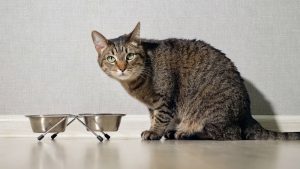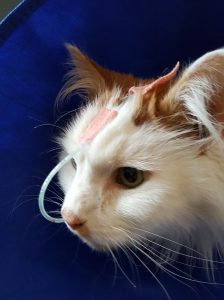Pancreatitis is emerging as a common problem in cats and can present with mild symptoms such as intermittent vomiting or more severe signs such as lethargy, weight loss, abdominal pain and inappetence. Although the exact cause of pancreatitis is often not known (called idiopathic), cats have a unique anatomy that is thought to predispose them to the disease as they share a common duct (or opening) between their pancreas, gut and liver. This means that when one of these organs becomes inflamed (as is often the case with the gut in gastroenteritis) then there is a chance that that inflammation will also ascend to affect the pancreas and liver too.

We diagnose pancreatitis based on a blood marker that has been specifically identified to the feline pancreas. This confirms there is inflammation within the pancreas, but doesn’t ascertain the cause – so in some cases we may advise an ultrasound examination to assess not only the pancreas itself, but the surrounding organs.
Unlike dogs, pancreatitis does not seem to be associated with feeding high-fat diets, but that does not mean that diet isn’t useful in managing the condition. In a mild case of pancreatitis we may advise you feed a bland, highly digestible complete diet to treat any underlying gastroenteritis and provide good quality nutrition to aid healing. Pancreatitis can be very uncomfortable and so in almost every case we will prescribe painkillers. We know that cats are masters of disguise when it comes to hiding pain and the first and only sign of pancreatitis can simply be lethargy or that the cat’s appetite subtly reduces. Therefore it is important that even if your cat does not appear to be in pain, they will recover more quickly and comfortably if they have pain relief.

In cats that only have intermittent vomiting or a reduced appetite we may choose to provide anti-nausea drugs or appetite stimulants that you can administer at home. Cats are often vitamin B deficient if they have concurrent inflammatory bowel disease (IBD) alongside the pancreatitis and so this can be supplemented with an oral course of vitamin B or vitamin B injections. Other treatments that can be used in pancreatitis are antibiotics (if there is suspicion of bacterial infection); pancreatic enzyme supplementation (to help aid in digestion of food and allow the pancreas to rest) and in some cases, steroid treatment used as an anti-inflammatory. We take each case and each cat individually and decide a treatment plan based on what we feel is best for you and your cat.
In more severe cases where there is vomiting, inappetence and/or diarrhoea, the cat may need fluids to treat the dehydration, correct any electrolyte imbalances and provide supportive treatment until food can be introduced. In mild cases subcutaneous fluids administered at home may be enough, but in severe cases hospitalisation for intravenous fluids may be best and in some severe forms where the cat refuses to eat for more than three days, even with appetite stimulants, a feeding tube may need to be placed.
Hopefully with a good mixture of supportive care providing correction of fluid/electrolyte imbalances, pain/nausea management and nutritional support, your cat will make a full recovery. The key with many things in cats is to act early! If you are suspicious your cat’s appetite has reduced, or they are behaving differently in some way then please contact your vet who can advise you on the next steps before things potentially get any worse, and hopefully get your kitty back to full health and happiness.

